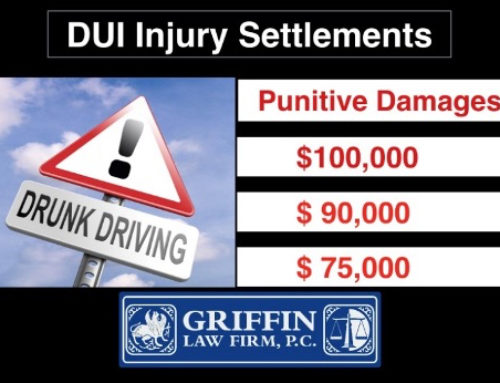As an experienced personal injury attorney, Richard Griffin has negotiated tens of thousands of claims. During these negotiations, adjusters have made a lot of crazy excuses to support their unreasonably low offers. The adjusters, of course, want to settle personal injury claims for as little as possible. The Griffin Law Firm makes sure that the insurance company doesn’t save money at your expense.
A fair personal injury offer must take into account the following:
- The extent of the injuries;
- The type of treatment required;
- The cost of the medical treatment;
- Permanent Impairment Ratings;
- Scarring;
- The lost wages;
- The client’s pain and suffering; and
- Punitive damages (D.U.I. or hit and run).
When an adjuster’s offer does not reasonably consider all of these factors, then you know it is unreasonable. The good news is you don’t have to take it. You can hire us to make sure you get your life back after a devasting accident. The Griffin Law Firm has a track record of getting great settlements even when adjusters first offers aren’t fair. We were able to negotiate a $235,000 settlement on a case that had been rejected by five prior attorneys.
Call us today at 877-PAIN-LAW or use our Settlement Calculator to find out what your case is worth and how we can help you get the recovery you need and deserve.
Real Life Adjuster Excuses: It may be hard to believe, but adjusters used all of the excuses discussed below in real personal injury negotiations. Why? Because when the adjuster’s offers are unreasonable, then they have to come up with reasons to support it. Often these reasons are not reasonable. After you read the adjuster’s ridiculous excuse, you can read our counter-argument to defeat their position.
- Adjuster’s Excuse – Low property damage means that no injury can occur.
- Griffin Law Firm’s Counter Point: I pointed out to this adjuster that serious injuries can occur with any amount of property damage. There are hundreds of factors regarding the vehicles involved and the physical condition of the claimant that can determine the extent of the injuries. Doctors don’t treat and evaluate injuries by examining the patient, not the car. The adjuster should not second guess the trained and licensed doctors.
- Adjuster’s Excuse – Gaps in treatment or delays in treatment mean the claimant wasn’t hurt.
- Griffin Law Firm’s Counter Argument: Many-times, gaps in care occur when injured people are hoping to get better without expensive or invasive treatment. Delays or gaps in treatment often have legitimate reasons for the treatment paused. Our skilled lawyers take the time to find out why the treatment stopped. We also can use medical testing results to overcome the negative impact of gaps in medical treatment. Photographs of bruising, scarring or other injuries are also very useful helpful in establishing your injury.
- Adjuster’s Excuse – Auto accidents cannot cause joint injuries, head injuries, or other specific types of injuries.
-
- Griffin Law Firm’s Counter Argument: Serious auto accidents can cause injuries to every part of the body. Adjusters are not doctors, biomechanical engineers, or accident re-constructionists, so they are not qualified to disregard injuries and treatment. We have successfully handled cases involving injuries to almost every part of the body. One adjuster told me that an auto accident could not cause a knee injury. I was shocked that the adjuster would take such an unreasonable position.
- Adjuster’s Excuse – The claimant’s job caused his injuries rather than the auto collision.
-
- Griffin Law Firm’s Counter Argument: It is unbelievably self-serving for the adjusters to assume injuries are from someone’s job when there has not been any on the job accidents. I pointed out that there were no open workers’ comp claim and no record of any injury or treatment from an on the job accident. It was also helpful that the claimant called the police and sought medical treatment on the date of the accident. We had medical records that stated the auto accident caused the injuries. The adjuster only had wild speculation without any documentation.
- Adjuster’s Excuse – Married couples should settle for less since they share an account.
-
- Griffin Law Firm’s Counter Argument: Are you kidding me? Married people’s personal injury claims are not worth less simply because they are married or share one account. I pointed out that each claimant had the right to be paid for all of his or her medical bills, lost wages, and pain and suffering. If needed, we would litigate for a jury verdict that would fully compensate each claimant married or not.
- Adjuster’s Excuse – Your client is old, so all of these medical conditions must be pre-existing.
-
- Griffin Law Firm’s Counter Argument: I was appalled when the adjuster discounted out of hand my client’s injuries based on her speculation that all of the claimant’s injuries were pre-existing.
- The adjuster argued, when you’re that old, all of your medical problems must have been there for years. On the contrary, I pointed out that older people are more easily injured and take longer to heal, so they should receive more money, not less. Many times older people’s overall health takes a massive hit after being injured in an auto accident. Even though there may be pre-existing degenerative conditions, these conditions often become unbearably more painful. The great news is that Georgia law requires claimants to recover for new injuries, as well as aggravation of pre-existing conditions.
- Adjuster’s Excuse – The claimant is young, so they are very flexible and not easily injured.
-
- Griffin Law Firm’s Counter Argument: Young people can sustain severe injuries or even death from auto accidents, sports accidents, and on the job accidents. Young people are human and can be hurt. They are not the superheroes that adjusters think they are. We rely on the doctors and diagnostic testing to establish the extent of injuries. Serious injuries always harm someone’s life. Often these injuries cause permanent limitations that continue to limit the claimant for the rest of their life.
- Adjuster’s Excuse – The claimant didn’t complain of injury at the accident scene or during treatment.
-
- Griffin Law Firm’s Counter Argument: People often do not know the extent of their injuries at the scene of the accident. Adrenaline can kick in, and your focus is usually on moving your vehicle and dealing with the police officer and other drivers. Many times, claimants feel sore at the accident scene but feel intense pain after the inflammation and swelling occurs.
We also point out that patients often say they’re “doing fine” or “doing better,” even when the pain has not fully resolved. In one of my cases, my client was a young girl that suffered a horrible scar to her elbow and leg. The adjuster took the position that the girl was not bothered by her severe scarring because she told the doctors that she was doing fine. In reality, she was extremely self-conscious about her scarring. A child psychiatrist evaluated her and confirmed the scarring was causing her a great deal of emotional distress, especially in social settings. We were able to turn the adjuster’s top offer of $20,000 into a $215,000 settlement at mediation.
- Adjuster’s Excuse – The pain management procedures or surgeries are experimental or too expensive, so we aren’t paying for it.
-
- Griffin Law Firm’s Counter Argument: Our injury attorneys argue that pain management procedures and surgeries are expensive even if the adjuster doesn’t like it. Serious injuries often require extensive diagnostic testing, surgical centers, and anesthesia. Adjusters love to arbitrarily reduce the cost of these procedures or even just reject the entire bill. Why? Because this supports their unreasonably low offers. We don’t let them get away with this. Litigation is the next step if the adjuster does not negotiate fairly. Fair negotiations require the adjuster to accept medical treatment and reasonable medical expenses. In one case, the adjuster rejected a P.R.P. injection (platelet-rich plasma injection) as “experimental.” We pointed out that medical clinics all over the country perform this procedure. The procedure is a newer procedure, but it is not an experimental procedure and is one that has shown excellent results in helping patients heal.
- Adjuster’s Excuse – The treatment was excessive or too expensive, so we’re not paying for it.
- Griffin Law Firm’s Counter Argument: The doctors are trained and qualified to determine treatment plans, not adjusters. An adjuster cannot arbitrarily disregard reasonable and customary treatment. Likewise, the adjuster cannot reduce or reject the treatment duration and treatment plan when treating doctors are qualified. The client has to pay these medical bills and does not have the luxury of just dismissing the charges. It is self-serving for adjusters to ignore medical bills to save the insurance company money. The settlement must pay the past and future medical expenses, as well as compensate for lost wages and pain and suffering.
- Adjuster’s Excuse – The claimant had the M.R.I. shortly after the collision or too late in the treatment plan.
-
- Griffin Law Firm’s Counter Argument: In this case, we asked the adjuster to send us a copy of her medical license and diploma. Doctors order M.R.I. testings when it is needed to know the extent of the injuries and the treatment that is necessary. To do any differently would not be providing the best possible care to their patient.
- Adjuster’s Excuse – The claimant has had prior claims, so they probably aren’t hurt.
-
- Griffin Law Firm’s Counter Argument: Under Georgia law, personal injury claimants can recover for new injuries, as well as aggravations to pre-existing conditions. The adjuster cannot disregard the claimant’s injuries and treatment simply because he or she has had similar problems in the past.
- Adjuster’s Excuse – The claimant had a subsequent accident, so we are no longer responsible for his or her personal injury claim.
-
- Griffin Law Firm’s Counter Argument: Subsequent accidents do not allow adjuster to disregard medical bills, lost wages, and pain and suffering. Adjusters should only reduce future pain and suffering based on a subsequent accident if the injuries are the same.
- Adjuster’s Excuse – The three months of treatment should be viewed as two weeks of treatment since the number of visits was only sixteen.
-
- Griffin Law Firm’s Counter Argument: This adjuster excuse made us scratch our heads. The patient was in pain for three months and was under the doctor’s care for three months. The adjuster can’t just erase the days the client was in pain just because he or she didn’t treat every single day.
- Adjuster’s Excuse – Liability isn’t clear, or the claimant could have done more to avoid the collision.
-
- Griffin Law Firm’s Counter Argument: The defendant is 100% liable for accidents he or she causes. The adjuster can’t speculate that the innocent driver should have somehow been able to do more when he or she has seconds to react. We use the police officer’s observations and conclusions, the witness statements, the defendant’s statements, and the evidence at the accident scene to establish that the defendant caused the collision. Photographs of the accident scene, injuries, and property damage can also be helpful.
We can help even if the adjuster isn’t fair. The good news is that the Griffin Law Firm has successfully negotiated or litigated for excellent recoveries for our clients even when the adjuster has made all of the above self-serving excuses. We can help even when the adjuster is treating unfairly. Why?
- Extensive investigation and Documentation: We work hard and dig into all of the facts of your case that support your claim. Our attorneys obtain the medical records and narratives to document your injuries and limitations.
- Get all of the treatment and testing you need: We help you get all of the treatment you need.
- Jury Verdict Research: We use the latest jury verdict research that is not available with internet searches to prove to the adjusters that the case is worth more than they believe it is worth it.
- High Settlements and Verdicts: Our attorneys can negotiate a significant settlement without litigation in about 90% of the cases. For the other 10% of the cases where adjusters aren’t fair, we will litigate for a verdict that will fully compensate you. The Griffin Law Firm and our attorneys have a track record of great settlements.
Free Case Evaluation: Call attorney Richard Griffin today at 877-PAIN-LAW to discuss your case and to find out how we can help you get your life back after a severe auto accident, work accident, slip and fall, or dog attack.
Free Settlement Calculator: Use our free Settlement Calculator to find out what your case is worth for free. You can’t get a great settlement if you don’t even know what your case is worth. Find out today.



